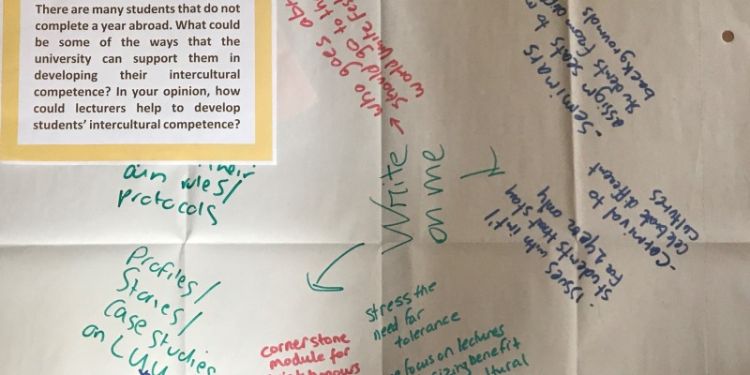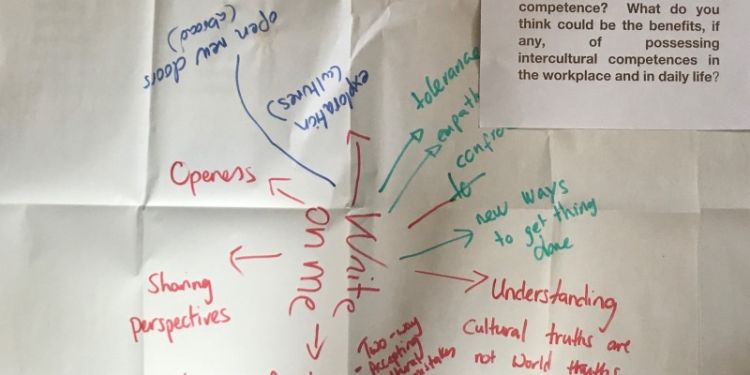The World Café: a qualitative research method
- Centre for International Business at the University of Leeds

What is the World Café method?
The World Café method is often used to construct a meaningful dialog and enrich participants’ knowledge of a subject through communication and interaction. The method draws on seven design principles:
- Clarify the context – this refers to the purpose of running a World Café
- Create a hospitable environment – this refers to the setting. The setting has to be similar to a café; welcoming and relaxed
- Explore questions that matter – each table in the café explores one question. The questions have to be thought-provoking and accessible for everyone
- Encourage everyone’s contribution – everyone must respect the opinion and beliefs of others
- Cross-pollinate and connect diverse perspectives - you may have different rounds in which participants switch table to answer a different question and connect ideas
- Listen together for pattern, insights and deeper questions – the whole aim of the World Café is to connect ideas and develop new ones and that can be done only by listening. Participants need to try to develop deeper insights and deeper questions
- Harvest and share collective discoveries – in this last phase the different thoughts and findings should be shared
The method has been applied in different communities, organisations, and companies eg Procter & Gamble, SAS Scandinavian Airlines, Intel, IBM, Bank of Mexico, helping to generate ideas and dialogue.
As a recipient of the Laidlaw Undergraduate Research and Leadership Scholarship (a two year research scheme), I spent the summers of 2016 and 2017 involved in a research project with Leeds University Business School. The aim of the project was to investigate how University teaching activities can help to develop students’ intercultural skills (the ability to communicate effectively and appropriately with people of other cultures). Whilst some students have the opportunity to study abroad and experience other cultures first-hand, many remain in Leeds for the duration of their studies and although surrounded by students and staff from around the world, may not have the skillset to interact effectively with their peers.
The purpose of my research was to:
- Find an appropriate research method to understand what students feel they need from innovative teaching practices in order to foster intercultural skill development
- Share the findings of my research with lecturers so they can adapt their current methods and enhance the development of intercultural skills with their students
Case study: implementing the World Café method
After researching qualitative data collection methods, I decided the World Café method was the most appropriate and developed a format similar to that of a focus group but with a greater emphasis on creating a welcoming and relaxed environment.

The participants of this study were students, academics and staff based at the University of Leeds. I provided nibbles and drinks for the participants and played Jazz music in the background to create a café atmosphere, decorating the room accordingly. The participants were divided across different tables and each table explored a different topic / question.
Example topics / questions:
- There are many students that do not undertake a year of studying abroad. Can you give me some examples of how lecturers at the University of Leeds have helped to develop students’ intercultural skills and international competencies in lecture, seminars, workshops, tutorial, etc.?
- In your opinion, how could lecturers be helped to learn about teaching methods that support students’ intercultural and international competencies development?
The World Café method consisted of different rounds of approximately 15-20 minutes. At the end of each round, participants were encouraged to switch table and engage with different people. As a method, there is no a set number of rounds that should be held – for my research it was determined that three rounds would be most appropriate.
The World Café method is based on the concept of building knowledge through sharing ideas. In each round everyone has the opportunity to add a new perspective to the question given. The first round is often the ‘getting to know’ phase; participants familiarise themselves with the topic, the location and the other participants. In the beginning there is often a little awkwardness between participants, however this changes in the proceeding round(s) and by the last round it can be hard to stop conversation between participants. It was striking to see and hear how participants were engaging with each other and how the dialog was constantly flowing around the room.

Practical ways lecturers can enhance intercultural skills
As a result of the participant discussions through the World Café method, the following comments and suggestions were made for activities to develop students’ intercultural skills within university teaching environments:
- The presence of international students is key
- Seminars were recognised as the best teaching practice in encouraging students to communicate effectively and appropriately with people of other cultures
- To introduce allocated seating, changing throughout the year, in seminars
- To introduce an activity similar to speed dating in seminars to share ideas
- To introduce the World Café method in seminars - it is often the case that people tend to group with others that think and act like them / they are familiar with
- To introduce a session explaining to students what seminar teaching is and how it works - some students come from countries where dialog is not encouraged, thus they are not used to this kind of teaching
- Group assignments are another great way to develop intercultural skills. Participants spoke positively about increasing the number of group assignments
- Events often tend to be targeted at international students, eg Global Café, International Welcome Party, and often native students feel like they can’t take part. Organising cultural events publicised as open to all would address this.
- To raise awareness of the importance of intercultural skills - students need to understand their value in order to develop such skills. This can be achieved by hosting guest speakers that can bring practical insights from their experiences
- Possibility for students to provide lecturers with feedback on how well they are encouraging the development of intercultural skills with the addition of suggestions on different activities.
“A more holistic and authentic way of discussing a topic”
The World Café method has proven to be strongly efficient in investigating ways in which intercultural skills can be enhanced in lectures and seminars. After the event participants commented that the World Café was “a more holistic and authentic way of discussing a topic”, “a good way to meet new people and learn about different experiences” and “the world café method was relaxed and this meant we were not nervous so we could be more honest”. It appeared easier for participants to generate valid ideas and arguments in an atmosphere where they felt stimulated and empowered to do so.
Find out more
To hear more about the World Café method, its practical applications, and the findings of my research into enhancing intercultural skills, come along to the Leeds Doctoral College Research Nights event on Tuesday 4 September 2018 at the University of Leeds.
Contact us
If you would like to get in touch regarding any of these blog entries, or are interested in contributing to the blog, please contact:
Email: research.lubs@leeds.ac.ukPhone: +44 (0)113 343 8754
Click here to view our privacy statement. You can repost this blog article, following the terms listed under the Creative Commons Attribution-NonCommercial-NoDerivatives 4.0 International licence.
The views expressed in this article are those of the author and may not reflect the views of Leeds University Business School or the University of Leeds.

